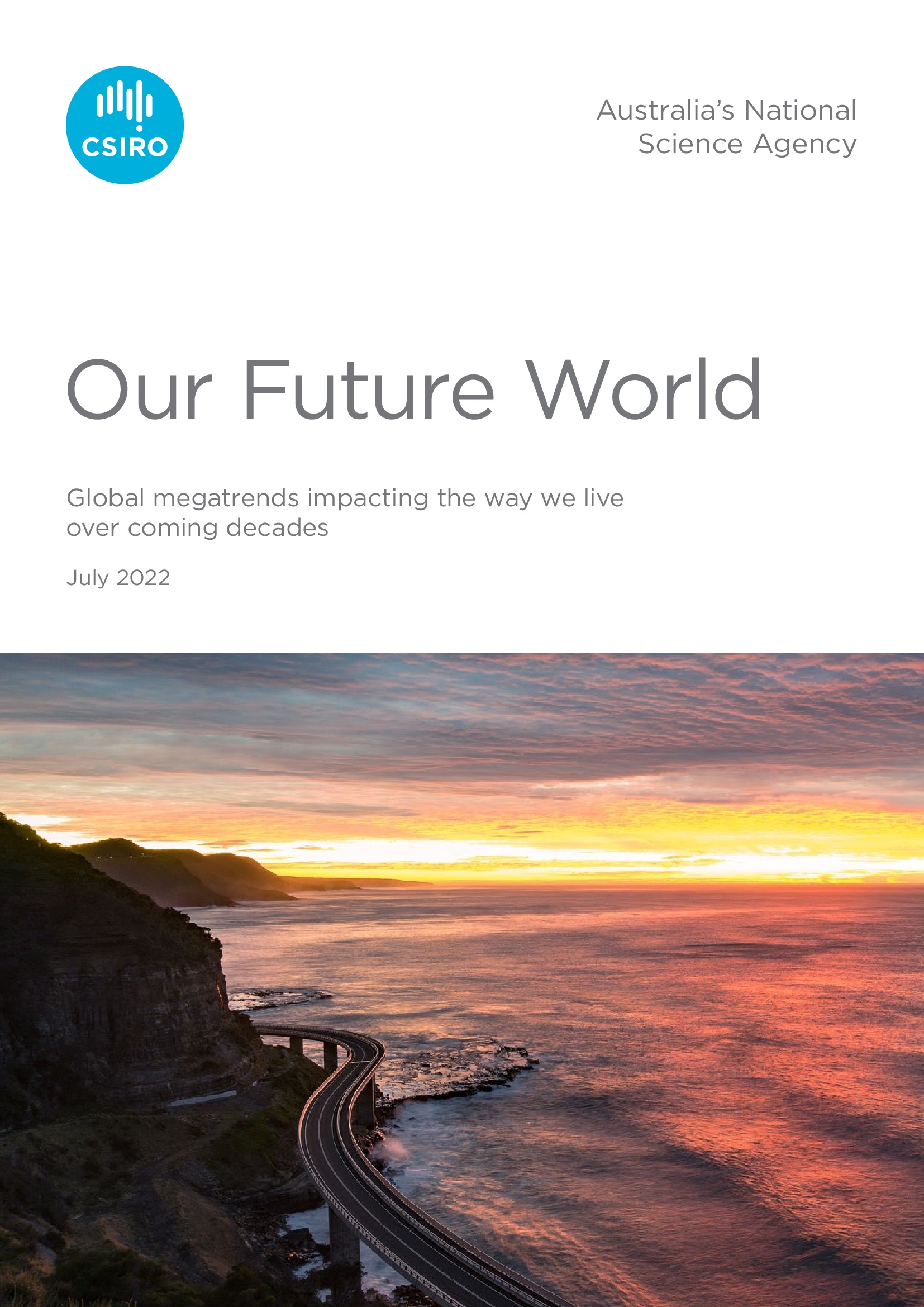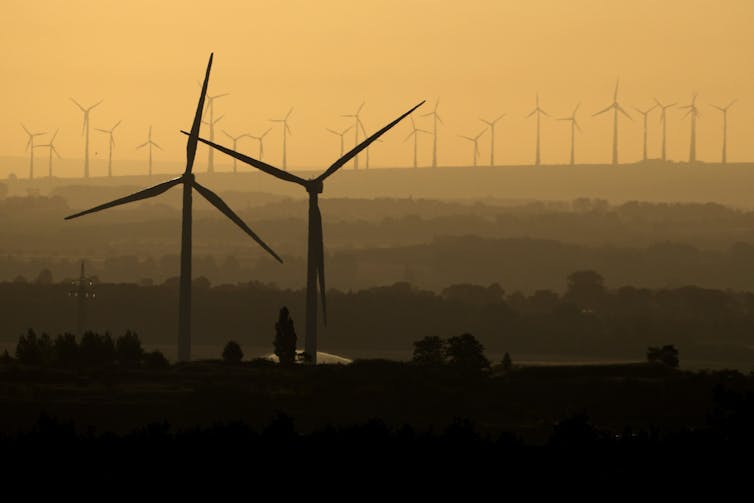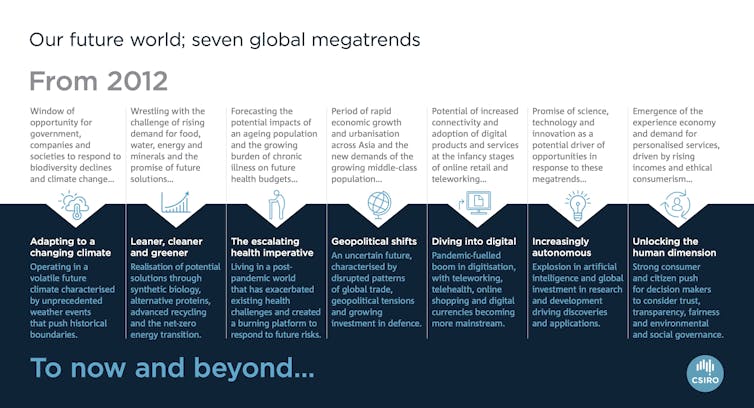July 31 - August 6, 2022: Issue 548
Seven Megatrends That Will Shape The Next 20 Years: New Report From CSIRO
July 27, 2022
A once-in-a-decade report from CSIRO, Australia’s national science agency, identifies seven global megatrends that hold the key to the challenges and opportunities ahead.
With an outlook to 2042, Our Future World revisits CSIRO’s ground-breaking 2012 report of the same name, exploring the geopolitical, economic, social, technological and environmental forces unfolding around the world, predicting their likely impact on Australia’s people, businesses and governments.
The seven global megatrends are: Adapting to climate change; Leaner, cleaner and greener; The escalating health imperative; Geopolitical shifts; Diving into digital; Increasingly autonomous and Unlocking the human dimension.
CSIRO Chief Executive Dr Larry Marshall said megatrends help us to understand the challenges and massive opportunities that will shape our future.
“Australia is at a pivotal point. There is a tidal wave of disruption on the way, and it’s critical we take steps now to get ahead of it," Dr Marshall said.
“From resource scarcity to drug resistant superbugs, disrupted global trade, and an increasingly unstable climate threatening our health and way of life – these are just some of the challenges we face.
“But these challenges also tell us where the most powerful innovation can be found, when we see a different future and leverage science to create it.
"Australia has the highest wind and solar capacity of any developed nation and a wealth of critical energy minerals – we can be a leader in feeding the world’s hunger for clean energy.
“The next wave of digital innovation will generate $10–15 trillion globally.
"Australia can tap into this to transform existing jobs and create new jobs and wealth while leveraging Artificial Intelligence to solve some of our greatest challenges, like outthinking bushfires, accelerating vaccine development, predicting drought, or stabilising our energy grid.
“We have the opportunity now to use science to invent the kind of world we want to live in – but we have to act, and we have to do it together.
“Trust in science led Australia’s response to COVID-19, and science can help us lead a Team Australia response to the challenges ahead," he said.
Our Future World report co-lead author Dr Stefan Hajkowicz said: “We analysed thousands of data points collected over decades. Some of the trends we identified have been widely discussed, while others are newer and directly related to our experiences during the pandemic.
"We are, for example, just beginning to understand the potential long-term impacts of the pandemic on mental health and chronic illness.
“We anticipate that while the pandemic sped up digital transformation, the real explosion in our capability is yet to come. In this environment, digital skills will become more valuable, but rather than replacing human intelligence, technologies like AI will assist us in doing our work better.”
Our Future World co-lead author Dr Claire Naughtin said: “Trust emerged as a central theme – trust in institutions, technology, supply chains and security will all be key issues over the coming two decades.
"Currently just under 70% of Australians do not trust AI systems but would be more willing to use these systems if appropriate ethical measures were in place.
“This latest update on the global megatrends gives us line of sight as to what has changed over the past decade and a view to the coming decades.
"Like aircraft engineers would use wind tunnels to test the robustness of new aircrafts, we can use these megatrends to develop, test and refine future strategies to ensure they are robust, whatever the future holds.”
Snapshot of the megatrends:
- Adapting to climate change: with natural disasters expected to cost the Australian economy almost three times more in 2050 than in 2017, we can expect to be living in a more volatile climate, characterised by unprecedented weather events.
- Leaner, cleaner and greener: an increased focus on potential solutions to our resource constraints through synthetic biology, alternative proteins, advanced recycling and the net-zero energy transition. By 2025, renewables are expected to surpass coal as the primary energy source.
- The escalating health imperative: the post-pandemic world has exacerbated existing health challenges posed by an ageing population and growing burden of chronic disease. One in five Australians report high or very high levels of psychological distress and there is heightened risk of infectious diseases and pathogens resistant to modern antibiotics. There is now a burning platform to also respond to our health risks and improve health outcomes.
- Geopolitical shifts: an uncertain future, characterised by disrupted patterns of global trade, geopolitical tensions and growing investment in defence. While the global economy shrunk by 3.2% in 2020, global military spend reached an all-time high of $2.9 trillion and Australia saw a 13% increase in cybercrime reported relative to the previous year.
- Diving into digital: the pandemic-fuelled a boom in digitisation, with teleworking, telehealth, online shopping and digital currencies becoming mainstream. Forty percent of Australians now work remotely on a regular basis and the future demand for digital workers expected to increase by 79% from 2020 to 2025.
- Increasing autonomous: there has been an explosion in artificial intelligence (AI) discoveries and applications across practically all industry sectors over the past several years. Within the science domain the use of AI is rising with the number of peer-reviewed AI publications increasing nearly 12 times from 2000 to 2019.
- Unlocking the human dimension: a strong consumer and citizen push for decision makers to consider trust, transparency, fairness and environmental and social governance. While Australia saw a record level increase in public trust in institutions during the pandemic, this ‘trust bubble’ has since burst, with societal trust in business dropping by 7.9% and trust in government declining by 14.8% from 2020-21.
Download a copy of Our Future World.

‘Like ocean rips’: CSIRO report identifies 7 ‘global megatrends’ shaping the 21st century
Stefan Hajkowicz, Data61 and Claire Naughtin, Data61Around 3.7 million Australians have been unintentionally caught in an ocean rip. For the unprepared it can be a harrowing experience – but for experienced surfers, rips are a handy way to ride through the whitewash and out to the break.
We’re not surfers, but we work at Australia’s national science agency in “strategic foresight”, which you can think of as the study of the currents taking the world into the future. These currents are a bit like ocean rips: they present risks for those who don’t understand them, but opportunities for societies, organisations and people who are prepared.
We call the biggest currents “megatrends”, and in a new report we examine the megatrends that will shape the next 20 years.
From learning to live in a changing climate and shrinking our ecological footprint to navigating geopolitical earthquakes and the rise of artificial intelligence, these seven megatrends will transform many aspects of our lives over the coming decades.
Our Future World
In 2012, CSIRO published a report called Our Future World, which delivered an evidence-based view of future megatrends to allow Australia to take early action in response.
The new report gives an update on where we’re at and where we’re going. It captures the impacts of the pandemic, among other trends and drivers.
Many of the issues we saw as possible or plausible in 2012 are now a lived reality.
Australia, like many other countries, is grappling with flooding, bushfires and extreme heat associated with climate change. Pandemics and infectious diseases, which were a footnote in our earlier writings, have had inescapable impacts in recent times.
And the global economic restructuring we spoke of 10 years ago, mainly as an opportunity, has an increasingly important geopolitical dimension. These trends will have key implications for countries like Australia seeking to maintain peace and stability.
So, what does the future have in store?
What Are The New Megatrends?
The first and perhaps most concerning megatrend we identified is “adapting to climate change”. Weather-related hazards are becoming more frequent and more severe, and many communities, industries and societies are not prepared for what lies ahead.
Heatwaves in Australia could be more than 85% more frequent and last up to a month if global temperatures rise between 1.5°C and 3°C. Building resilience to extreme weather events will be critical over the coming decade.
The second megatrend is what we call “leaner, cleaner and greener”: innovative solutions to meet demand for the world’s finite food, water, mineral and energy resources.

Renewable energy and low-emissions technologies, synthetic biology, alternative proteins and advanced recycling all allow us to operate within much tighter envelopes. Recent estimates suggest Australia is on track to generate half its electricity from renewables by 2025.
Health At Risk In A Changing World
The third megatrend is “the escalating health imperative”: ageing populations, high rates of chronic illness, and a pandemic-driven surge in mental health issues are driving an unsustainable growth in healthcare spending. This spending is expected to grow faster than GDP in most OECD countries over the coming decade.
Infectious disease risks associated with pandemics, outbreaks and antimicrobial drug resistance will elevate into the future. There is an urgent need for innovation in the healthcare sector to find ways to do more with less.
The fourth megatrend is “geopolitical shifts”: disrupted patterns of global trade, geopolitical tensions and growing investment in defence.
While the global economy shrunk by 3.2% in 2020, global military spend reached an all-time high of A$2.9 trillion. This expenditure coincides with growing geopolitical tensions in the Asia-Pacific region.
At the same time, we have seen increased co-operation between democratic countries, including the recent expansion of the North Atlantic Treaty Organization to include Finland and Sweden.
The Digital And The Human
The fifth megatrend is “diving into digital”. While the digital economy has been growing rapidly for some time, the pandemic fuelled a boom in teleworking, telehealth, online retail, education and entertainment.
Around 40% of Australians now work remotely on a regular basis. The digital workforce is expected to increase by 79% from 2020 to 2025.
The sixth megatrend we identified is “increasingly autonomous”. As the capabilities of artificial intelligence (AI) have surged, it has found applications across practically all industry sectors.
AI research is taking a growing share of global research and development spending and peer-reviewed research publications. These developments are opening up opportunities to boost productivity and address some of humanity’s greatest challenges.

The final megatrend is “unlocking the human dimension”. Issues relating to trust, transparency and environmental and social governance are of particular importance.
While Australia saw a temporary boost in public trust in institutions in 2021, this trust bubble was short-lived. Societal trust in Australia dropped below the global average yet again in 2022.
The Innovation Imperative
Our study of the current state of global megatrends presents a sobering view of the future and the challenges ahead of us. But this knowledge also equips us with the power to shape this future, by understanding the ocean rips we want to ride or survive.
As we look to the future of this work at CSIRO, we will focus on working with industry, government and academia to tackle Australia’s greatest challenges. Using these megatrends, we can focus our science and technology on the big things that matter the most and create real value for all Australians.![]()
Stefan Hajkowicz, Senior Principal Scientist, Strategy and Foresight, Data61 and Claire Naughtin, Senior Research Consultant in Strategic Foresight, Data61
This article is republished from The Conversation under a Creative Commons license. Read the original article.